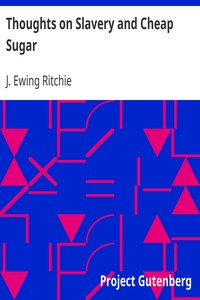Thoughts on Slavery and Cheap Sugar by J. Ewing Ritchie
"Thoughts on Slavery and Cheap Sugar" by J. Ewing Ritchie is a social and political pamphlet written in the mid-19th century, likely during the early Victorian era. This work serves as a critical reflection on the interconnected issues of slavery and the sugar trade, specifically addressing the moral and economic implications of supporting slave-grown sugar in Britain. Ritchie, addressing members of the British and Foreign Anti-Slavery Society, urges a reevaluation of their
stance on free trade and its role in the abolition of slavery. The pamphlet comprises a passionate argument against the persistence of slavery fueled by the British marketplace's support for a sugar monopoly. Ritchie critiques the existing practices and policies that, in his view, sustain both slavery abroad and economic hardship at home, particularly for the working class. He argues that the monopoly on sugar, maintained under the guise of anti-slavery sentiment, ultimately harms not just the enslaved individuals but also the laborers in Britain who face increased prices for essential goods. By promoting free trade and the reduction of import duties on sugar, Ritchie believes that the free market would organically diminish the viability of slave labor, thus proposing a shift in focus from moralistic posturing to economically sensible and ethically sound practices that truly support emancipation. (This is an automatically generated summary.)
Read or download for free
| How to read | Url | Size | |||
|---|---|---|---|---|---|
| Read now! | https://www.gutenberg.org/ebooks/52820.html.images | 104 kB | |||
| EPUB3 (E-readers incl. Send-to-Kindle) | https://www.gutenberg.org/ebooks/52820.epub3.images | 127 kB | |||
| EPUB (older E-readers) | https://www.gutenberg.org/ebooks/52820.epub.images | 127 kB | |||
| EPUB (no images, older E-readers) | https://www.gutenberg.org/ebooks/52820.epub.noimages | 100 kB | |||
| Kindle | https://www.gutenberg.org/ebooks/52820.kf8.images | 260 kB | |||
| older Kindles | https://www.gutenberg.org/ebooks/52820.kindle.images | 247 kB | |||
| Plain Text UTF-8 | https://www.gutenberg.org/ebooks/52820.txt.utf-8 | 89 kB | |||
| Download HTML (zip) | https://www.gutenberg.org/cache/epub/52820/pg52820-h.zip | 126 kB | |||
| There may be more files related to this item. | |||||
Similar Books
About this eBook
| Author | Ritchie, J. Ewing (James Ewing), 1820-1898 |
|---|---|
| Title |
Thoughts on Slavery and Cheap Sugar A Letter to the Members and Friends of the British and Foreign Anti-Slavery Society |
| Note | Reading ease score: 63.9 (8th & 9th grade). Neither easy nor difficult to read. |
| Credits | Transcribed from [1844?] Aylott and Jones edition by David Price |
| Language | English |
| LoC Class | HD: Social sciences: Economic history and conditions, Production |
| Subject | Slavery |
| Subject | Slave trade |
| Subject | Sugar trade |
| Category | Text |
| EBook-No. | 52820 |
| Release Date | Aug 16, 2016 |
| Copyright Status | Public domain in the USA. |
| Downloads | 160 downloads in the last 30 days. |
| Project Gutenberg eBooks are always free! | |


